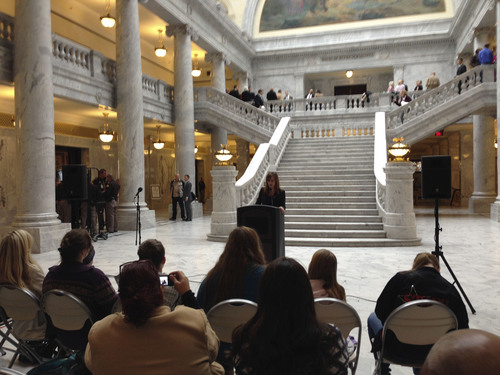This is an archived article that was published on sltrib.com in 2014, and information in the article may be outdated. It is provided only for personal research purposes and may not be reprinted.
A West Valley City man slammed his girlfriend's head into the wall.
Then he punched her. He threw her to the ground and smashed a lamp over her head. He smashed her face into the toilet, ripped her clothes off and sexually assaulted her. As the woman begged her boyfriend to stop, he lifted a "zombie killer" sword into the air.
"I hope you're ready to die," he said.
The brutality of the attack — which the woman ultimately survived — is recounted in court documents filed late last month. The documents explain that the woman ended up in a hospital with head lacerations, bruising, facial swelling and numerous petechiae, a kind of spot that indicates hemorrhaging. Many details of the attack were so grisly they couldn't be printed.
The man, whose nickname is listed in the documents as "Buddy the Clown," ended up charged with five felonies, including aggravated kidnapping and two counts of object rape.
Its a harrowing story that stands out for its savagery, but it's also just one of a multitude of stories foreshadowing a looming problem: Utah is falling behind when it comes to serving victims of domestic violence.
Jenn Oxborrow — domestic violence program administrator for the Utah Department of Human Services — explained that the people working with survivors of domestic violence are accomplishing tremendous things with limited resources. Over the past five years, she said, funding has remained flat but 13 private domestic violence shelters in the state have managed to house more than 41 percent more survivors — going from 76,767 shelter nights in 2008 to 108,377 nights in 2012.
But despite the increased services, many people continue to fall through the cracks. Oxborrow said that over those same five years the number of people who weren't served by domestic violence shelters increased by 67 percent. In 2012, that meant 2,809 people — mostly women and children — were turned away by already-full domestic violence shelters.
Kendra Wyckoff, the executive director of the Utah Domestic Violence Coalition, added that Utah's rates of rape and domestic violence are higher than the national average. Wyckoff spoke Monday during a press conference at the Utah State Capitol during which advocates called on legislators and Utah residents to support $693,500 in funding for domestic violence programs. She also called on Utah residents to urge their legislators to support the funding.
"The challenge," Wyckoff said, "is that a lot of these programs are completely full."
The consequences of this problem are startling. According to Oxborrow, nearly 40 percent of the homicides in Utah are related to domestic violence. Women who suffer domestic violence have double the rate of mental illness and binge drinking as other women.
Keri Jones-Fonnesbeck, the chief program officer for the Utah YWCA, added during Monday's conference that the state is "losing entire families." Jones-Fonnesbeck pointed to the recent murder-suicide in Spanish Fork and the Susan Powell case, noting that in both instances entire families died.
Domestic violence also can lead to post-traumatic stress disorder, depression and other negative health conditions. For children, the impact can be particularly long-lasting; the Adverse Childhood Experiences Study conducted by the Center for Disease Control showed that kids who experience abuse and dysfunction tend to have higher rates of health and social problems.
Not all of the incidents of domestic violence are as brutal as the woman who was nearly stabbed by a sword. But crimes of domestic violence in Utah are common; just on Friday in Salt Lake County alone prosecutors filed three felony assault cases that included domestic violence. Those filings represent only the most severe cases and, like the incident in West Valley City, each of them was sparked by a harrowing conflict between intimate partners.
And Friday was just a typical day; new domestic violence-related criminal filings are so common that they rarely even make headlines.
Despite the disturbingly pedestrian nature of domestic violence in Utah, Oxborrow stressed that the situation is not hopeless. Citing the money domestic violence advocates hope to secure from the state government, Oxborrow explained that the situation can improve as more people are served and experts better understand what is going on in the state. The idea, she said, is to keep filling in the gaps the domestic violence support system currently experiences.
"If we can catch people in jeopardy earlier and support people we'll be more successful," she said.
For more information on domestic violence in Utah, visit udvc.org.
Twitter: @jimmycdii



